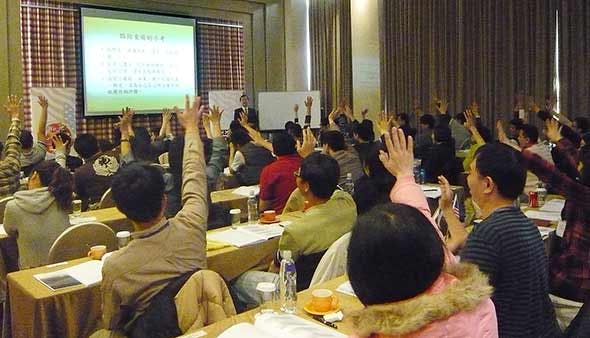Educational Seminar Aims to Rebuild Climate for U.S. Beef in Taiwan
Published: May 05, 2011
Because of the ractopamine issue, many Taiwanese importers have taken a conservative approach with U.S. beef despite strong consumer demand and a shrinking supply. Since ractopamine is a confusing issue for retailers and foodservice operators, they want more information to communicate with their customers and regain their loyalty and confidence in U.S. beef.
To address the concerns of these key constituencies, USMEF recently hosted a two-day educational training seminar that featured an in-depth look at the current market for U.S. beef, suggested marketing strategies and provided a short introduction to beta-agonists - especially ractopamine. The marketing concepts featured in the seminar focused on maximizing the value of U.S. beef and sustaining sales levels. Expert panelists interacted one-on–one with participants to help them understand why the U.S. meat industry applies such food technologies, and how they are used in a safe and efficient manner. Support for the seminar was provided by the Beef Checkoff Program and the USDA Market Access Program.
To address the concerns of these key constituencies, USMEF recently hosted a two-day educational training seminar that featured an in-depth look at the current market for U.S. beef, suggested marketing strategies and provided a short introduction to beta-agonists - especially ractopamine. The marketing concepts featured in the seminar focused on maximizing the value of U.S. beef and sustaining sales levels. Expert panelists interacted one-on–one with participants to help them understand why the U.S. meat industry applies such food technologies, and how they are used in a safe and efficient manner. Support for the seminar was provided by the Beef Checkoff Program and the USDA Market Access Program.

“The partners attending this seminar are hoping to gain a better knowledge of ractopamine use so they can address their customers’ concerns and regain their confidence,” said USMEF Taiwan Director Davis Wu. “Although the ractopamine-related trade barrier cannot be solved in the near term, providing customer education and other factual information is presently the highest priority for USMEF. The immediate target audience is the importer, who can then pass the desired message down to their clientele.”
“American beef is still popular in the Taiwanese market despite the negative voices,” said Steven Tsui, marketing manager for Shuh-Sen Co. “I want to thank USMEF for hosting this educational training session for importers, which I think is an excellent start toward our goal of restoring trade. I hope to see more of these seminars in the future.”
“It is USMEF’s duty to promote and market U.S. beef in this market, creating more business opportunities for our partners and rebuilding a positive business environment,” Wu said. “Although the focus on ractopamine has affected U.S. beef sales in Taiwan, we still strive to cultivate a positive business climate and maintain positive consumer attitudes toward U.S. beef.”
Through February, U.S. beef exports to Taiwan totaled 3,931 metric tons (8.7 million pounds) valued at $23.7 million. This is a 32 percent decline in volume and a 23 percent drop in value compared to the record-setting results of 2010. Weekly export data suggest March was another difficult month for U.S. beef in Taiwan, but activity rebounded significantly in April.
“American beef is still popular in the Taiwanese market despite the negative voices,” said Steven Tsui, marketing manager for Shuh-Sen Co. “I want to thank USMEF for hosting this educational training session for importers, which I think is an excellent start toward our goal of restoring trade. I hope to see more of these seminars in the future.”
“It is USMEF’s duty to promote and market U.S. beef in this market, creating more business opportunities for our partners and rebuilding a positive business environment,” Wu said. “Although the focus on ractopamine has affected U.S. beef sales in Taiwan, we still strive to cultivate a positive business climate and maintain positive consumer attitudes toward U.S. beef.”
Through February, U.S. beef exports to Taiwan totaled 3,931 metric tons (8.7 million pounds) valued at $23.7 million. This is a 32 percent decline in volume and a 23 percent drop in value compared to the record-setting results of 2010. Weekly export data suggest March was another difficult month for U.S. beef in Taiwan, but activity rebounded significantly in April.
